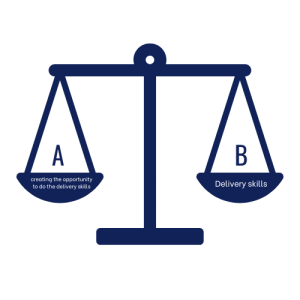When I teach coaches how to market, I explain to them that they need to find a demographic group who have a problem that coaching can resolve.
Almost without exception, those who have attended a free event I’ve given appear on LinkedIn within a few days, asking questions like, ‘What’s the biggest problem you have right now?’
The issue with this kind of question is that it will not get the answer the coach hopes for.
Answers will include things like:
- my toddler is teething right now and I’m not getting enough sleep
- my car has a problem that the garage can’t find
- I have a bad tooth, and getting a dentist appointment is proving tricky
- my teenager is messing around at school and won’t study for their GCSE’s
In short, they’ll answer the question about the most pressing things in their lives. They’re not going to be able to give you the answer you’re looking for because, in the list of life issues, it’s not number one.
But if you’ve done the work properly, it absolutely is a number one issue in the particular area of their lives in which you have knowledge and experience. To be clear, when you’re looking for a problem, you’re looking for a problem that coaching can help resolve in a very specific area of someone’s life.
Let me give you a couple of examples of what I’m talking about:
- Whilst being constantly overlooked for promotion may not feature as highly on the ‘hassle-factor’ gauge as a teething toddler, it certainly features very highly in the career area of their life, and coaching can help resolve it.
- Whilst feeling anxious about retirement may not feature as highly as a toothache in day-to-day life, it certainly does in the ‘happy future’ area of their life, and coaching can help to resolve it.
Can you see why ‘what’s the biggest problem you’re struggling with’ posts on social media aren’t the clever solution you hoped they might be?
Knowledge And Experience
Coaching is absolutely not about inserting our knowledge and experience into the sessions. But – and it’s a big but – marketing our coaching business IS about our knowledge and experience.
This is the point at which many coaches do this > 🤯
But….! they splutter, it’s not about me!
And they’re right when they’re talking about the delivery side of their business – but we’re not talking about the delivery side of your business here. We’re talking about creating the opportunities to do the delivery side of your business and that, dear coach, is absolutely about your knowledge and experience.
The diagram below shows the skill sets needed—and their proportions—to create a financially viable coaching business with your own clients – either private clients or within organisations. The two sides represent A – creating the opportunity to do the delivery skills and B – the delivery skills. Coaches usually have B in spades and very little understanding of A at all.


Do You Have a Front Row Seat?
One of the heart-sink conversations I have reasonably regularly is when someone tells me they have an executive coaching qualification and want to coach C-Suite. They will often tell me that taking this qualification was a strategic decision because they want to charge £500+ to minimise the number of hours they need to work to reach their income goals. Then they tell me that they have no experience working in C-Suite or working alongside C-Suite professionals in another capacity.
Could they coach these individuals? Yes, of course they could.
Can they market to them in a way that is a) authentic and b) effective – no. This is because they cannot describe a problem that’s affecting these C-Suite people, a problem that’s troubling to the extent that it’s keeping them awake at night – and the potential reasons for this problem. Coaches need to be able to do this based on their own knowledge and experience of the problem, and if it wasn’t them who experienced it, they need to have had a front-row seat to someone who does. And being able to do this is what marketing is about.
So What Can A Coach Do?
This is what a coach needs to do:
- Understand that you need to learn how to create the opportunities to do the delivery that is coaching.
- In fact, understand that the wonderful experience of delivering coaching is the reward you get for mastering the art of creating the opportunities to do so.
- Choose a provider (I’m going to tell you to choose us for all kinds of reasons, not least our specialisation in working with coaches and our ICF accreditation) who can teach you how to market.
- Put the time and effort into getting the most out of your programme.
If you’d like to know more about what working with us looks like, this link is for our diary to book a call.

Recent Comments